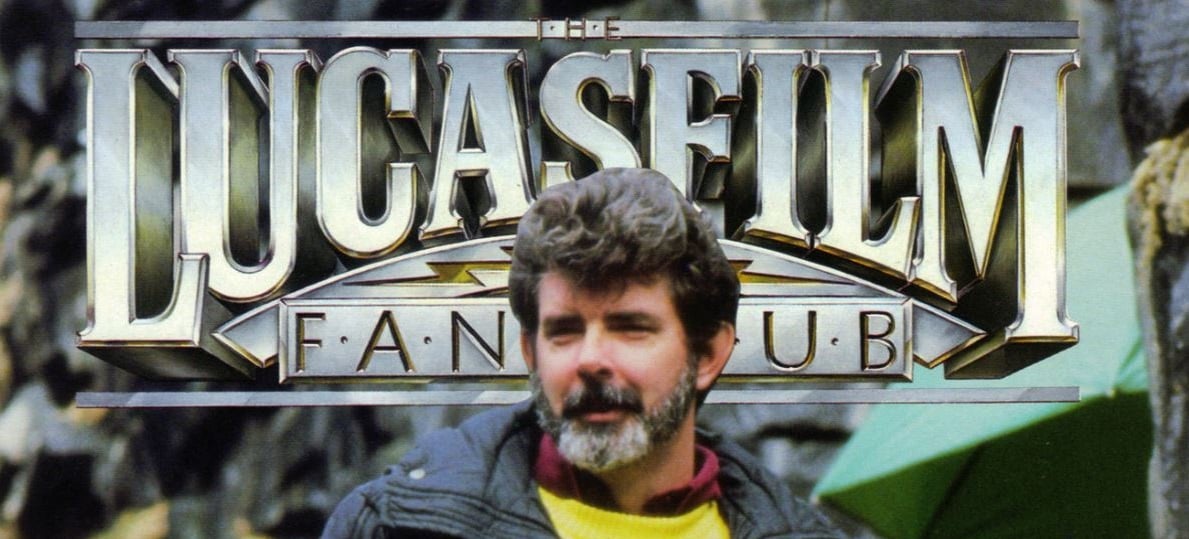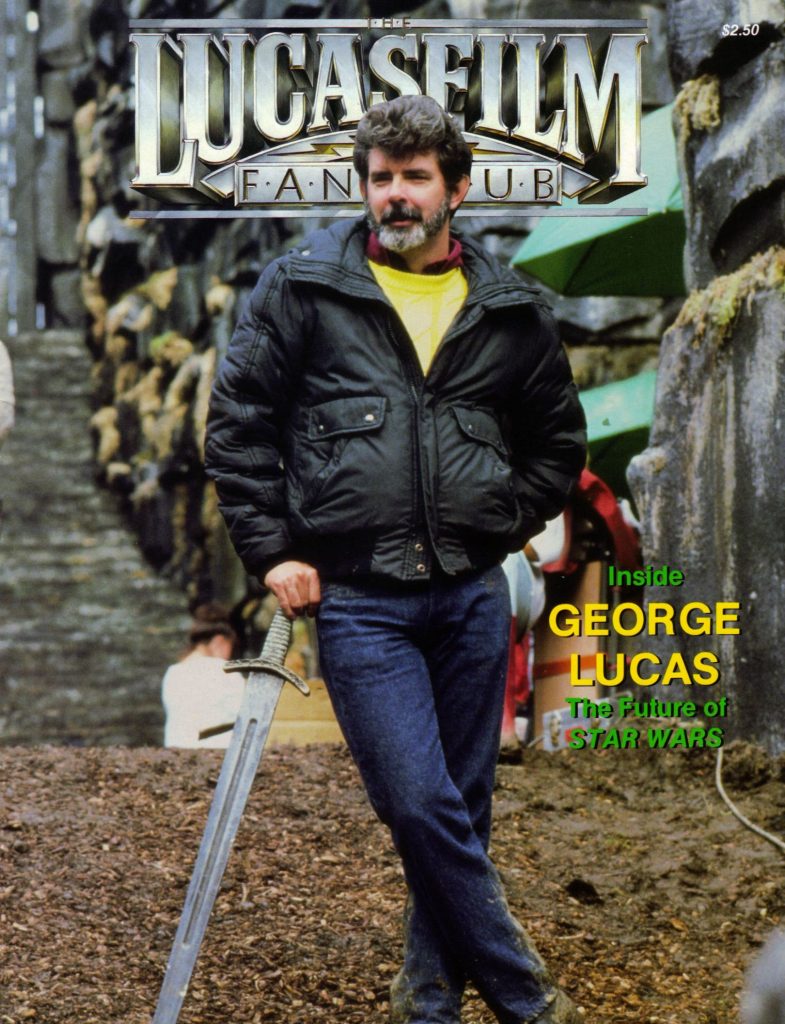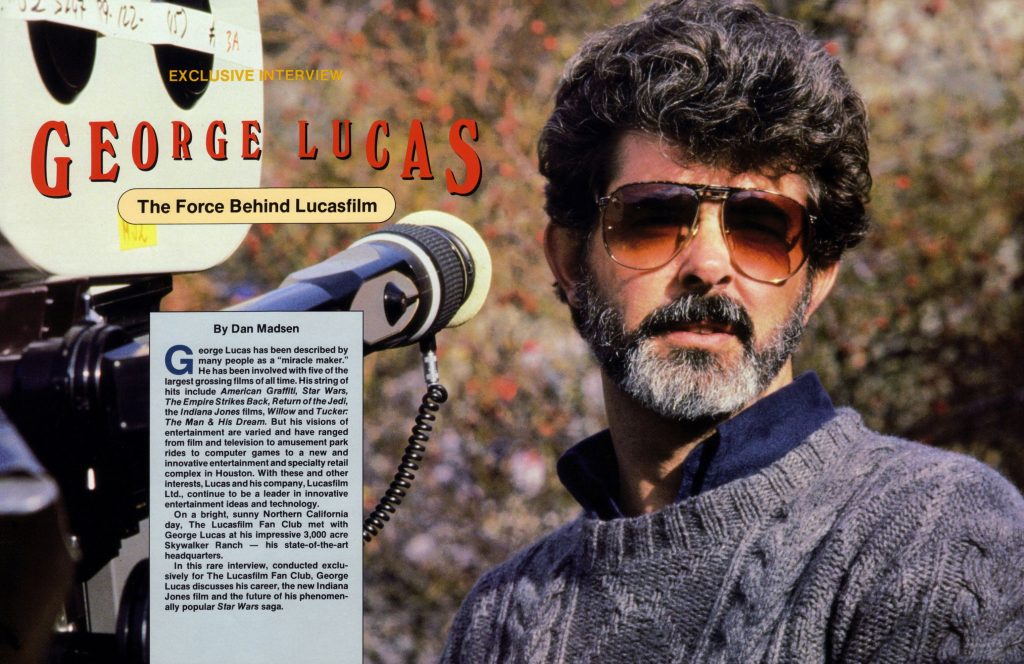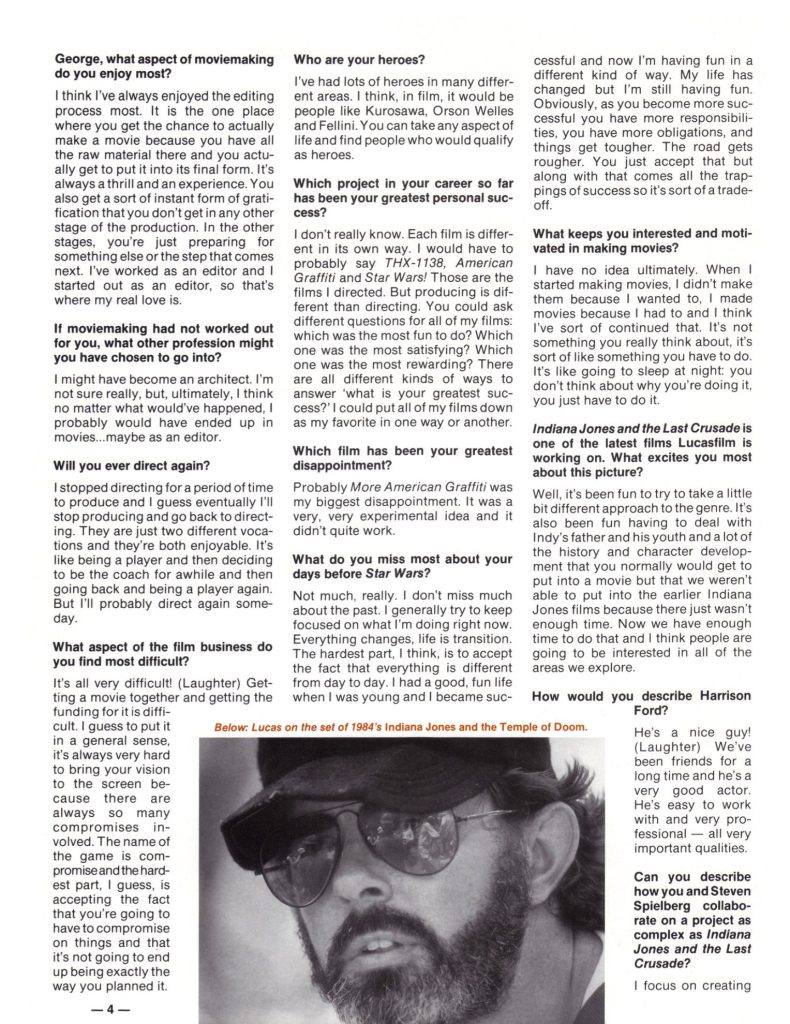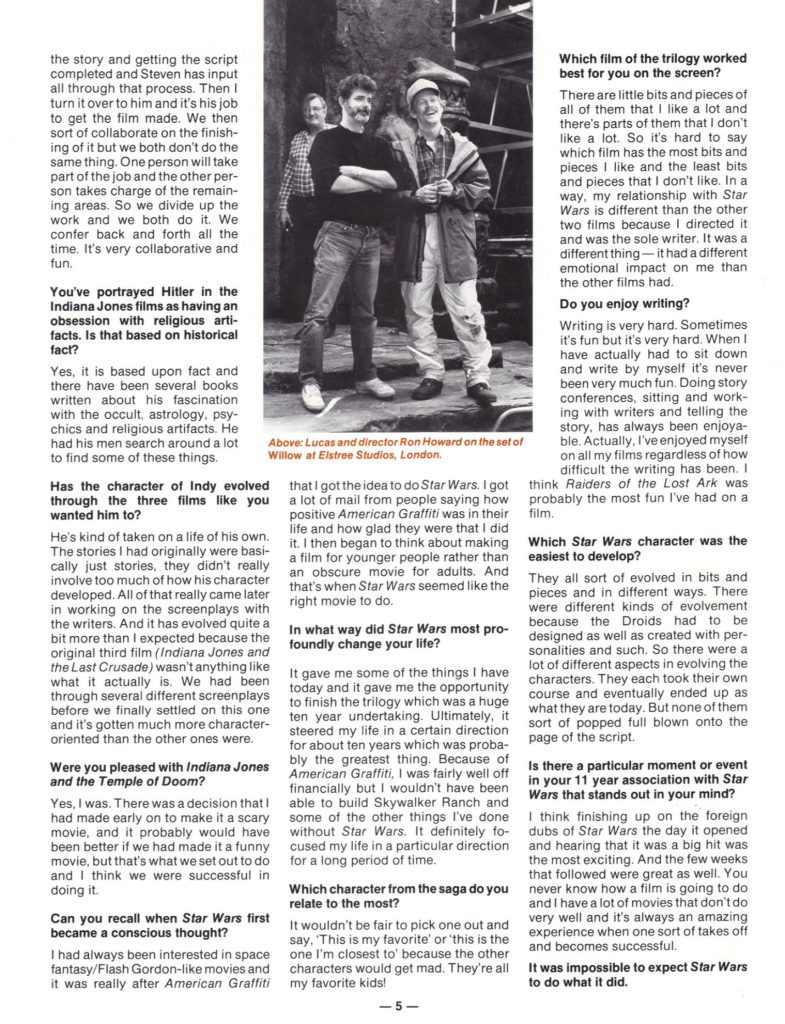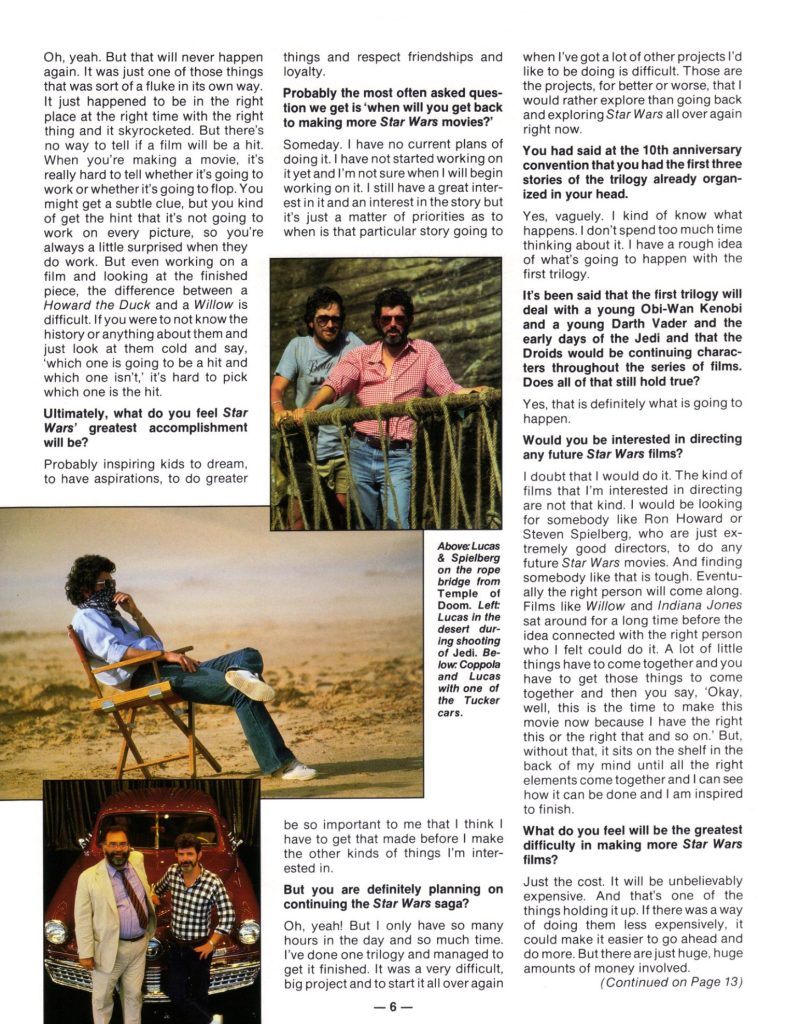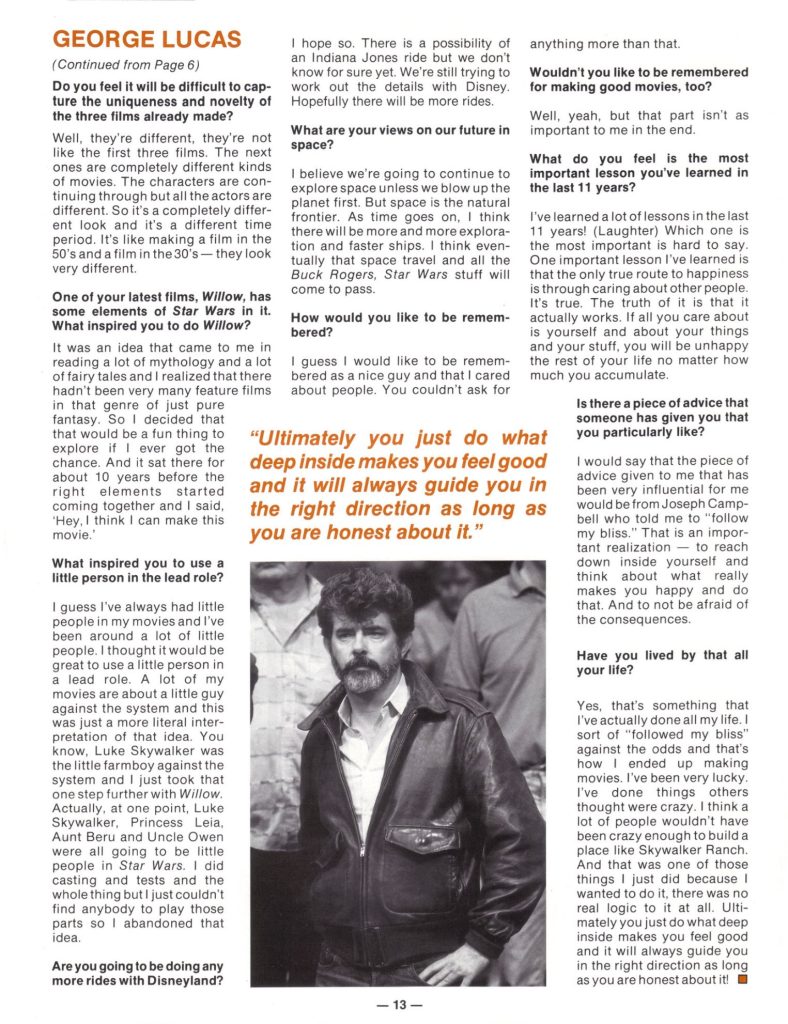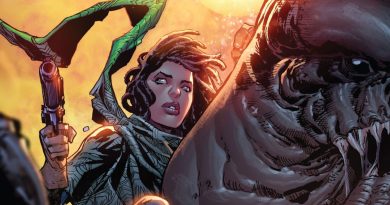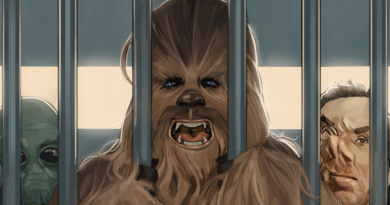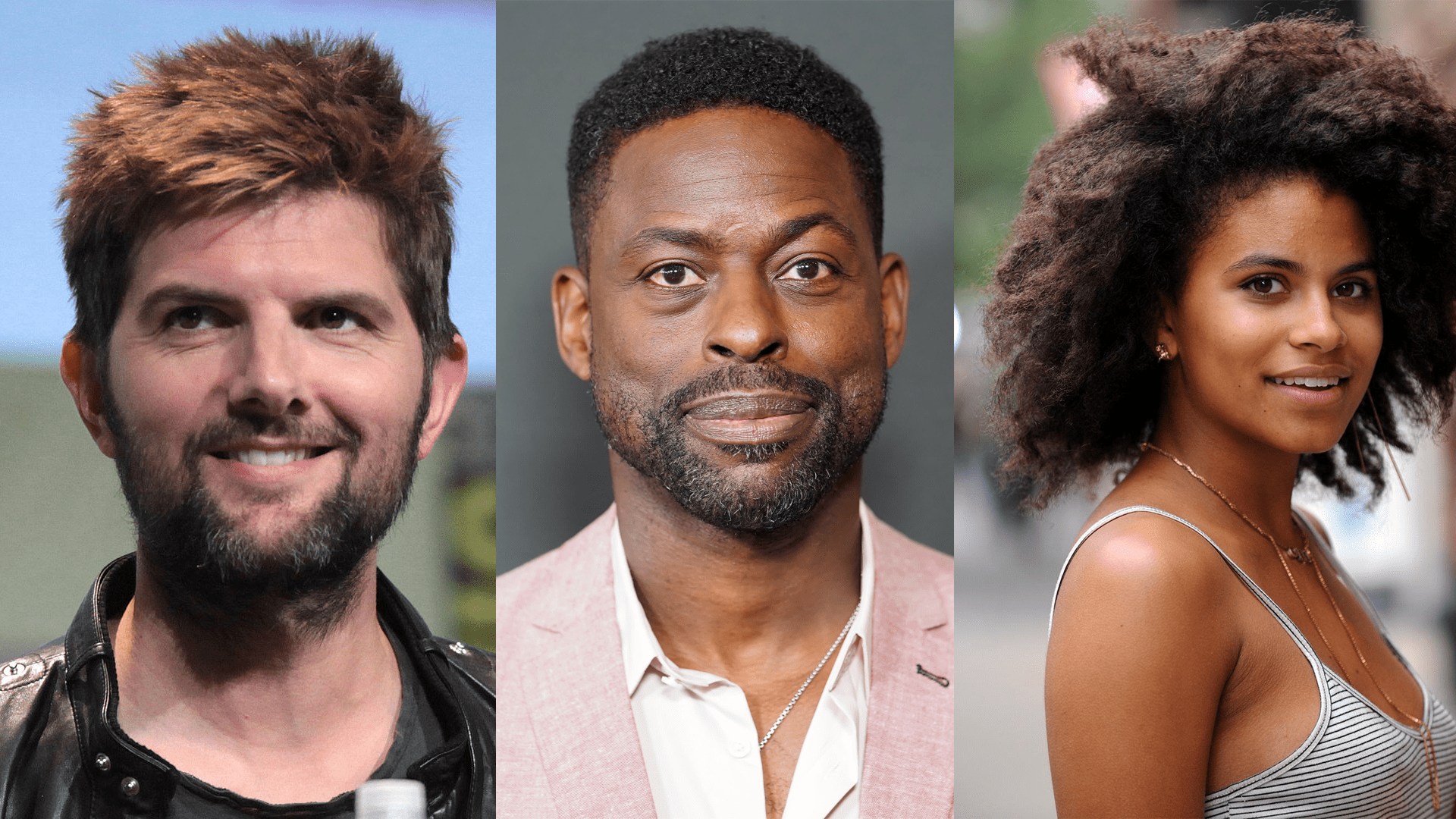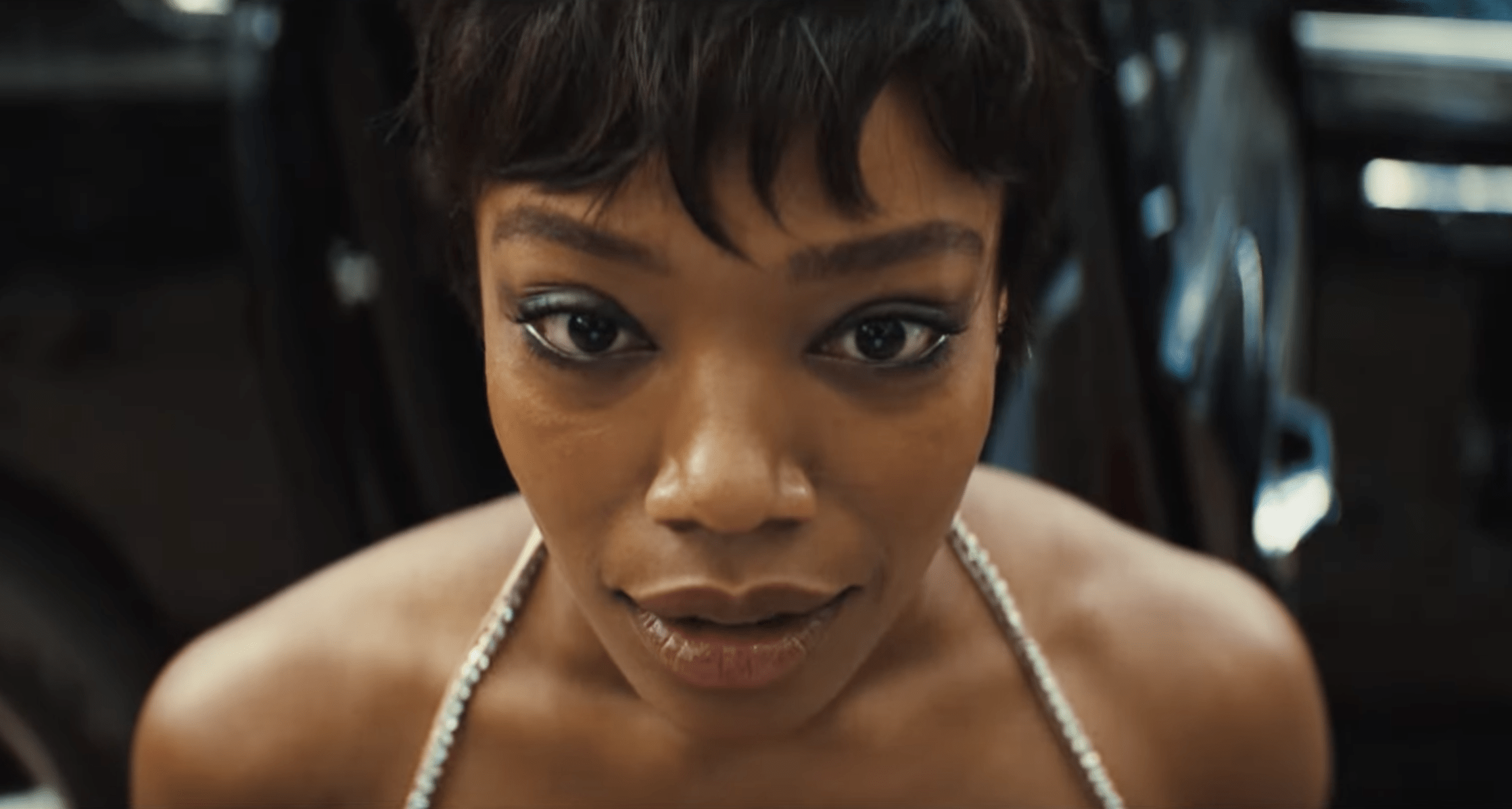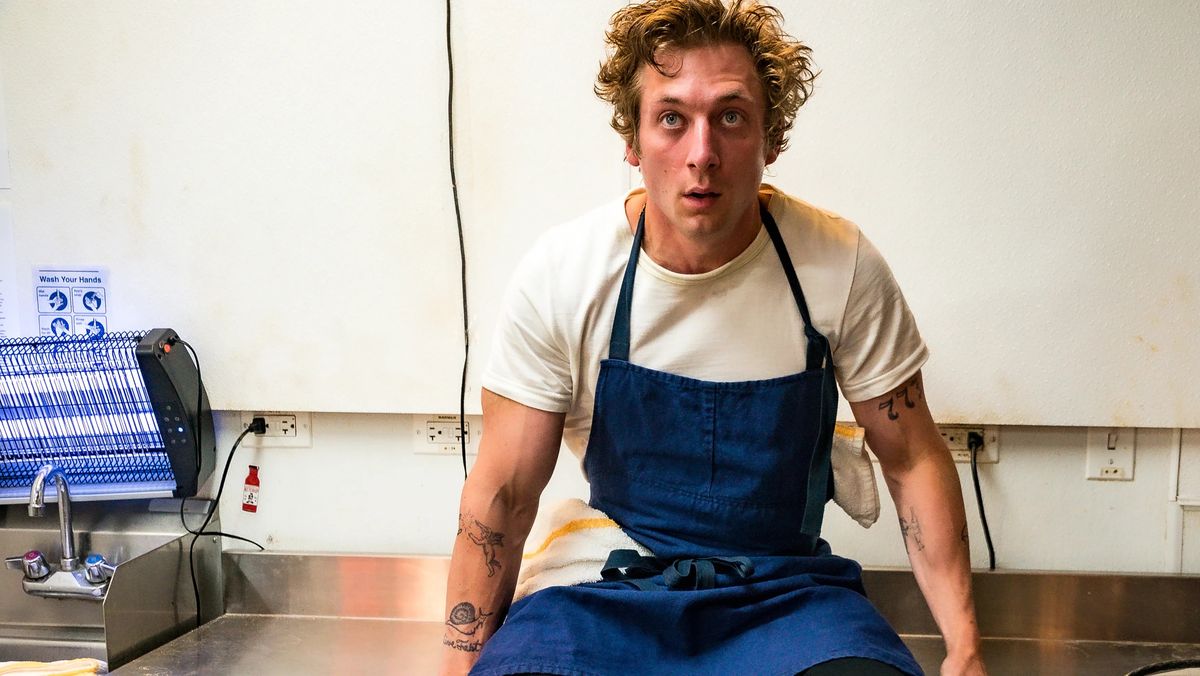“George Lucas: The Force Behind Lucasfilm” From the ‘Lucasfilm Fan Club’ #6 (1989)
As I read through the back issues of the Lucasfilm Fan Club Magazine, there are so many interesting things throughout, like adverts for brilliant merch which would be called retro today, convention listings, classifieds with people selling items like books and figures… But on top of those, it’s full of great interviews, of which I am sharing some as I come across them.
This time around, I am sharing one with the legendary George Lucas that has some fascinating tidbits given how old it is — he kind of already knew what was going to happen with the first trilogy all the way back in 1989!
Enjoy this transcription of the original article, which you can read below.
George Lucas: The Force Behind Lucasfilm
George Lucas has been described by many people as a “miracle maker.” He has been involved with five of the largest grossing films of all time. His string of hits include American Graffiti, Star Wars, The Empire Strikes Back, Return of the Jedi, the Indiana Jones films, Willow, and Tucker.
The Man & His Dream. But his visions of entertainment are varied and have ranged from film and television to amusement park rides to computer games to a new and innovative entertainment and specialty retail complex in Houston. With these and other interests, Lucas and his company Lucasfilm Ltd. continue to be a leader in innovative entertainment ideas and technology.
On a bright, sunny Northern California day, the Lucasfilm Fan Club met with George Lucas at his impressive 3,000 acre Skywalker Ranch — his state-of-the-art headquarters. In this rare interview, conducted exclusively for the Lucasfilm Fan Club, George Lucas discusses his career, the new Indiana Jones film, and the future of his phenomenally popular Star Wars saga.
George, what aspect of moviemaking do you enjoy most?
I think I’ve always enjoyed the editing process most. It is the one place where you get the chance to actually make a movie because you have all the raw material there and you actually get to put it into its final form. It’s always a thrill and an experience. You also get a sort of instant form of gratification that you don’t get in any other stage of the production. In the other stages, you’re just preparing for something else or the step that comes next. I’ve worked as an editor and I started out as an editor, so that’s where my real love is.
If moviemaking had not worked out for you, what other profession might you have chosen to go into?
I might have become an architect. I’m not sure really, but, ultimately, I think no matter what would’ve happened, I probably would have ended up in movies… maybe as an editor.
Will you ever direct again?
I stopped directing for a period of time to produce and I guess eventually I’ll stop producing and go back to directing. They are just two different vocations and they’re both enjoyable. It’s like being a player and then deciding to be the coach for a while and then going back and being a player again.
But I’ll probably direct again someday.
What aspect of the film business do you find most difficult?
It’s all very difficult! (Laughter) Getting a movie together and getting the funding for it is difficult. I guess to put it in a general sense, it’s always very hard to bring your vision to the screen because there are always so many compromises involved. The name of the game is compromise and the hardest part, I guess, is accepting the fact that you’re going to have to compromise on things and that it’s not going to end up being exactly the way you planned it.
Who are your heroes?
I’ve had lots of heroes in many different areas. I think, in film, it would be people like Kurosawa, Orson Welles and Fellini. You can take any aspect of life and find people who would qualify as heroes.
Which project in your career so far has been your greatest personal success?
I don’t really know. Each film is different in its own way. I would have to probably say THX-1138, American Graffiti and Star Wars! Those are the films I directed. But producing is different than directing. You could ask different questions for all of my films: which was the most fun to do? Which one was the most satisfying? Which one was the most rewarding? There are all different kinds of ways to answer, ‘what is your greatest success?’ I could put all of my films down as my favorite in one way or another.
Which film has been your greatest disappointment?
Probably More American Graffiti was my biggest disappointment. It was a very, very experimental idea and it didn’t quite work.
What do you miss most about your days before Star Wars?
Not much, really. I don’t miss much about the past. I generally try to keep focused on what I’m doing right now. Everything changes, life is transition. The hardest part, I think, is to accept the fact that everything is different from day to day. I had a good, fun life when I was young and I became successful and now I’m having fun in a different kind of way. My life has changed but I’m still having fun.
Obviously, as you become more successful you have more responsibilities, you have more obligations, and things get tougher. The road gets rougher. You just accept that but along with that comes all the trappings of success so it’s sort of a trade-off.
What keeps you interested and motivated in making movies?
I have no idea ultimately. When I started making movies, I didn’t make them because I wanted to, I made movies because I had to and I think I’ve sort of continued that. It’s not something you really think about, it’s sort of like something you have to do.
It’s like going to sleep at night: you don’t think about why you’re doing it, you just have to do it.
Indiana Jones and the Last Crusade is one of the latest films Lucasfilm is working on. What excites you most about this picture?
Well, it’s been fun to try to take a little bit different approach to the genre. It’s also been fun having to deal with Indy’s father and his youth and a lot of the history and character development that you normally would get to put into a movie but that we weren’t able to put into the earlier Indiana Jones films because there just wasn’t enough time. Now we have enough time to do that and I think people are going to be interested in all of the areas we explore.
How would you describe Harrison Ford?
He’s a nice guy!
(Laughter) We’ve been friends for a long time and he’s a very good actor.
He’s easy to work with and very professional – all very important qualities.
Can you describe how you and Steven Spielberg collaborate on a project as complex as Indiana Jones and the Last Crusade?
I focus on creating the story and getting the script completed and Steven has input all through that process. Then I turn it over to him and it’s his job to get the film made. We then sort of collaborate on the finishing of it but we both don’t do the same thing. One person will take part of the job and the other person takes charge of the remaining areas. So we divide up the work and we both do it. We confer back and forth all the time. It’s very collaborative and fun.
You’ve portrayed Hitler in the Indiana Jones films as having an obsession with religious artifacts. Is that based on historical fact?
Yes, it is based upon fact and there have been several books written about his fascination with the occult, astrology, psychics and religious artifacts. He had his men search around a lot to find some of these things.
Has the character of Indy evolved through the three films like you wanted him to?
He’s kind of taken on a life of his own.
The stories I had originally were basically just stories, they didn’t really involve too much of how his character developed. All of that really came later in working on the screenplays with the writers. And it has evolved quite a bit more than I expected because the original third film (Indiana Jones and the Last Crusade) wasn’t anything like what it actually is. We had been through several different screenplays before we finally settled on this one and it’s gotten much more character-oriented than the other ones were.
Were you pleased with Indiana Jones and the Temple of Doom?
Yes, I was. There was a decision that I had made early on to make it a scary movie, and it probably would have been better if we had made it a funny movie, but that’s what we set out to do and I think we were successful in doing it.
Can you recall when Star Wars first became a conscious thought?
I had always been interested in space fantasy/Flash Gordon-like movies and it was really after American Graffiti that I got the idea to do Star Wars. I got a lot of mail from people saying how positive American Graffiti was in their life and how glad they were that I did it. I then began to think about making a film for younger people rather than an obscure movie for adults. And that’s when Star Wars seemed like the right movie to do.
In what way did Star Wars most profoundly change your life?
It gave me some of the things I have today and it gave me the opportunity to finish the trilogy which was a huge ten year undertaking. Ultimately, it steered my life in a certain direction for about ten years which was probably the greatest thing. Because of American Graffiti, I was fairly well off financially, but I wouldn’t have been able to build Skywalker Ranch and some of the other things I’ve done without Star Wars. It definitely focused my life in a particular direction for a long period of time.
Which character from the saga do you never know how a film is going to do relate to the most?
It wouldn’t be fair to pick one out and say, ‘This is my favorite’ or this is the one I’m closest to’ because the other characters would get mad. They’re all my favorite kids!
Which film of the trilogy worked best for you on the screen?
There are little bits and pieces of all of them that | like a lot and there’s parts of them that I don’t like a lot. So it’s hard to say which film has the most bits and pieces I like and the least bits and pieces that I don’t like. In a way, my relationship with Star Wars is different than the other two films because I directed it and was the sole writer. It was a different thing – it had a different emotional impact on me than the other films had.
Do you enjoy writing?
Writing is very hard. Sometimes it’s fun but it’s very hard. When I have actually had to sit down and write by myself it’s never been very much fun. Doing story conferences, sitting and working with writers and telling the story, has always been enjoyable. Actually, I’ve enjoyed myself on all my films regardless of how difficult the writing has been. I think Raiders of the Lost Ark was probably the most fun I’ve had on a film.
Which Star Wars character was the easiest to develop?
They all sort of evolved in bits and pieces and in different ways. There were different kinds of evolvement because the Droids had to be designed as well as created with personalities and such. So there were a lot of different aspects in evolving the characters. They each took their own course and eventually ended up as what they are today. But none of them sort of popped full blown onto the page of the script.
Is there a particular moment or event in your 11 year association with Star Wars that stands out in your mind?
I think finishing up on the foreign – dubs of Star Wars the day it opened and hearing that it was a big hit was the most exciting. And the few weeks that followed were great as well. You and I have a lot of movies that don’t do very well and it’s always an amazing experience when one sort of takes off and becomes successful.
It was impossible to expect Star Wars to do what it did.
Oh, yeah. But that will never happen again. It was just one of those things that was sort of a fluke in its own way.
It just happened to be in the right place at the right time with the right thing and it skyrocketed. But there’s no way to tell if a film will be a hit.
When you’re making a movie, it’s really hard to tell whether it’s going to work or whether it’s going to flop. You might get a subtle clue, but you kind of get the hint that it’s not going to work on every picture, so you’re always a little surprised when they do work. But even working on a film and looking at the finished piece, the difference between a Howard the Duck and a Willow is difficult. If you were to not know the history or anything about them and just look at them cold and say, ‘which one is going to be a hit and which one isn’t.’ it’s hard to pick which one is the hit.
Ultimately, what do you feel Star Wars‘ greatest accomplishment will be?
Probably inspiring kids to dream, to have aspirations, to do greater things and respect friendships and loyalty.
Probably the most often asked question we get is ‘when will you get back to making more Star Wars movies?’
Someday. I have no current plans of doing it. I have not started working on it yet and I’m not sure when I will begin working on it. I still have a great interest in it and an interest in the story but it’s just a matter of priorities as to when is that particular story going to be so important to me that I think I have to get that made before I make the other kinds of things I’m interested in.
But you are definitely planning on continuing the Star Wars saga?
Oh, yeah! But I only have so many hours in the day and so much time.
I’ve done one trilogy and managed to get it finished. It was a very difficult, big project and to start it all over again when I’ve got a lot of other projects I’d like to be doing is difficult. Those are the projects, for better or worse, that I would rather explore than going back and exploring Star Wars all over again right now.
You had said at the 10th anniversary convention that you had the first three stories of the trilogy already organized in your head.
Yes, vaguely. I kind of know what happens. I don’t spend too much time thinking about it. I have a rough idea of what’s going to happen with the first trilogy.
It’s been said that the first trilogy will deal with a young Obi-Wan Kenobi and a young Darth Vader and the early days of the Jedi and that the Droids would be continuing characters throughout the series of films. Does all of that still hold true?
Yes, that is definitely what is going to happen.
Would you be interested in directing any future Star Wars films?
I doubt that I would do it. The kind of films that I’m interested in directing are not that kind. I would be looking for somebody like Ron Howard or Steven Spielberg, who are just extremely good directors, to do any future Star Wars movies. And finding somebody like that is tough. Eventually the right person will come along.
Films like Willow and Indiana Jones sat around for a long time before the idea connected with the right person who I felt could do it. A lot of little things have to come together and you have to get those things to come together and then you say, ‘Okay, well, this is the time to make this movie now because I have the right this or the right that and so on.’ But, without that. it sits on the shelf in the back of my mind until all the right elements come together and I can see how it can be done and I am inspired to finish.
What do you feel will be the greatest difficulty in making more Star Wars films?
Just the cost. It will be unbelievably expensive. And that’s one of the things holding it up. If there was a way of doing them less expensively, it could make it easier to go ahead and do more. But there are just huge, huge amounts of money involved.
Do you feel it will be difficult to capture the uniqueness and novelty of the three films already made?
Well, they’re different, they’re not like the first three films. The next ones are completely different kinds of movies. The characters are continuing through but all the actors are different. So it’s a completely different look and it’s a different time period. It’s like making a film in the 50’s and a film in the 30’s – they look very different.
One of your latest films, Willow, has some elements of Star Wars in it. What inspired you to do Willow?
It was an idea that came to me in reading a lot of mythology and a lot of fairy tales and I realized that there hadn’t been very many feature films in that genre of just pure fantasy. So I decided that that would be a fun thing to explore if i ever got the chance. And it sat there for 10 years before the right elements started coming together and I said, ‘Hey, I think I can make this movie.
What inspired you to use a little person in the lead role?
I guess I’ve always had little people in my movies and I’ve been around a lot of little people. I thought it would be great to use a little person in a lead role. A lot of my movies are about a little guy against the system and this was just a more literal interpretation of that idea. You know, Luke Skywalker was the little farmboy against the system and I just took that one step further with Willow.
Actually, at one point, Luke Skywalker, Princess Leia, Aunt Beru and Uncle Owen were all going to be little people in Star Wars. I did casting and tests and the whole thing but I just couldn’t find anybody to play those parts so I abandoned that idea.
Are you going to be doing any more rides with Disneyland?
I hope so. There is a possibility of an Indiana Jones ride but we don’t know for sure yet. We’re still trying to work out the details with Disney.
Hopefully there will be more rides.
What are your views on our future in space?
I believe we’re going to continue to explore space unless we blow up the planet first. But space is the natural frontier. As time goes on, I think there will be more and more exploration and faster ships. I think eventually that space travel and all the Buck Rogers, Star Wars stuff will come to pass.
How would you like to be remembered?
I guess I would like to be remembered as a nice guy and that I cared about people. You couldn’t ask for anything more than that.
Wouldn’t you like to be remembered for making good movies, too?
Well, yeah, but that part isn’t as important to me in the end.
What do you feel is the most important lesson you’ve learned in the last 11 years?
I’ve learned a lot of lessons in the last – 11 years! (Laughter) Which one is the most important is hard to say. One important lesson I’ve learned is that the only true route to happiness is through caring about other people.
It’s true. The truth of it is that it actually works. If all you care about is yourself and about your things
and your stuff, you will be unhappy the rest of your life no matter how much you accumulate.
Is there a piece of advice that someone has given you that you particularly like?
I would say that the piece of advice given to me that has been very influential for me would be from Joseph Campbell who told me to “follow my bliss.” That is an important realization – to reach down inside yourself and think about what really makes you happy and do that. And to not be afraid of the consequences.
Have you lived by that all your life?
Yes, that’s something that I’ve actually done all my life. I sort of “followed my bliss” against the odds and that’s how I ended up making movies. I’ve been very lucky.
I’ve done things others thought were crazy. I think a lot of people wouldn’t have been crazy enough to build a place like Skywalker Ranch.
And that was one of those things I just did because I wanted to do it, there was no real logic to it at all. Ultimately you just do what deep inside makes you feel good and it will always guide you in the right direction as long as you are honest about it!
Alexander has been a lifelong Star Wars fan having started watching with his elder brother in the early 80's through to watching The Phantom Menace with same brother in cinema as a 21 year old with beer.
His love for the franchise has never waned.
A published comic book writer and letterer but when not watching or reading Star Wars is usually hacking computers for work.
Follow on twitter @Muldwych

